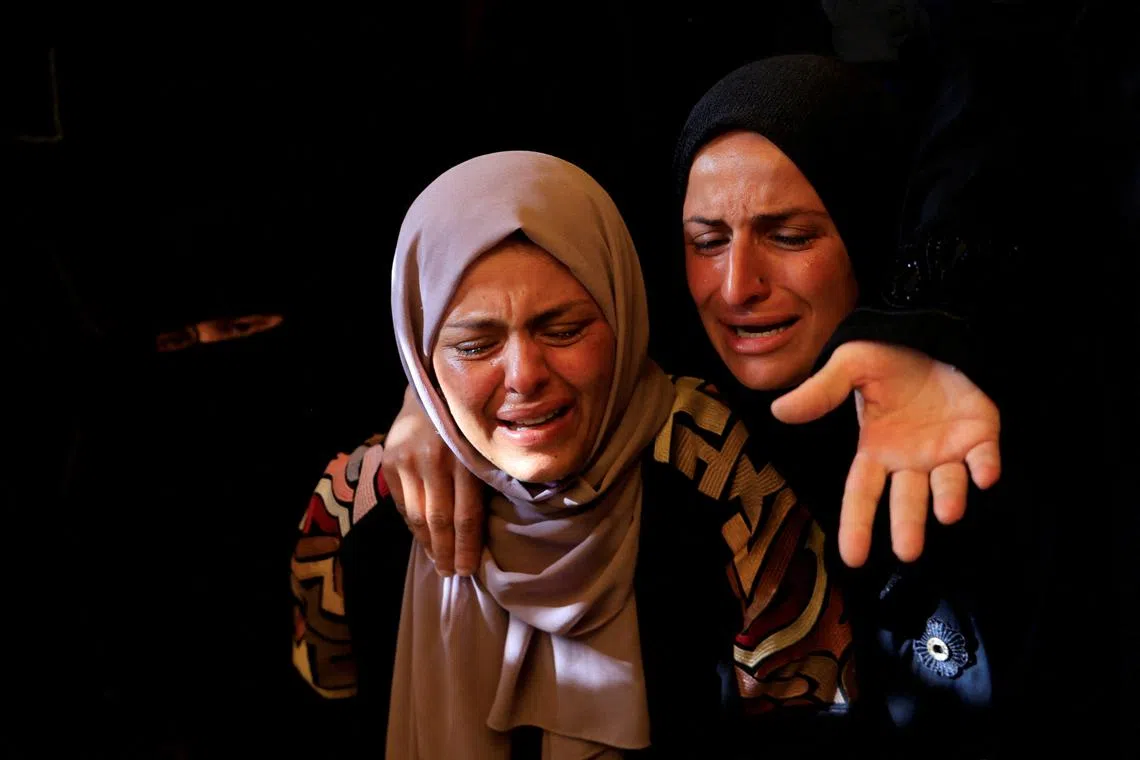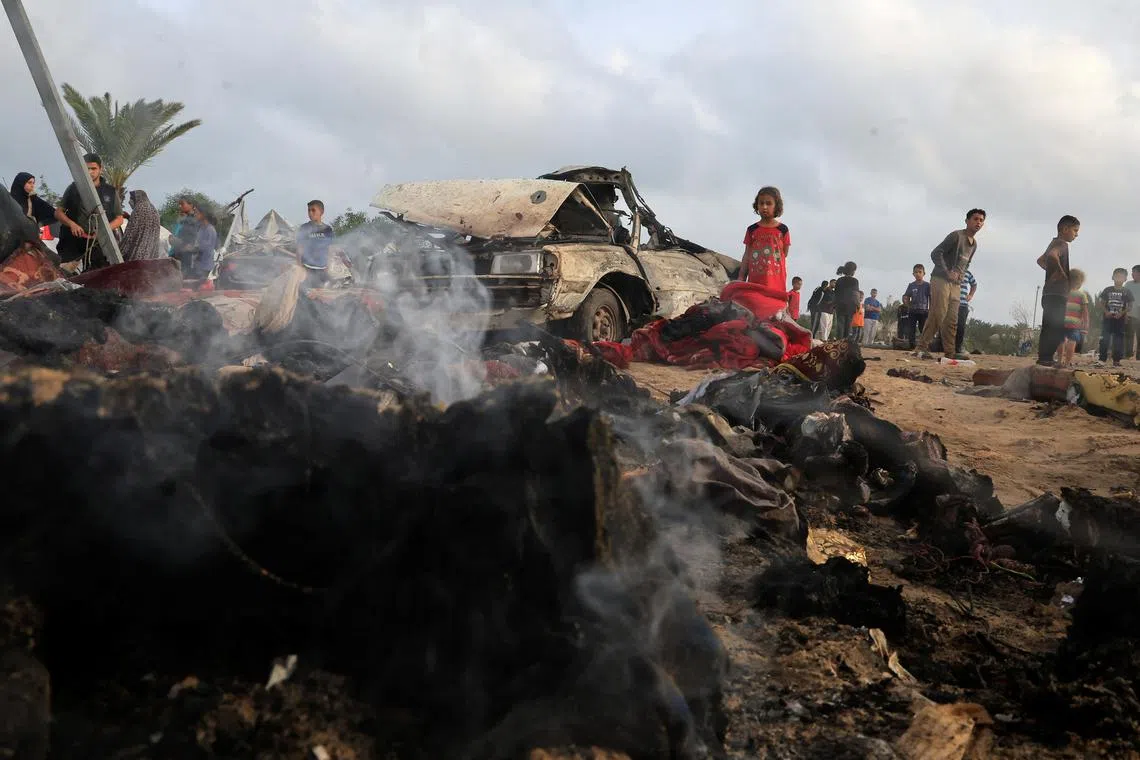Israel says it will let food into Gaza after announcing new ground assault
Sign up now: Get insights on Asia's fast-moving developments

Palestinians gathering outside a charity kitchen in Gaza city to receive limited food rations, on May 18.
PHOTO: EPA-EFE
CAIRO/JERUSALEM – Israel will ease its blockade and let limited amounts of food into Gaza, Prime Minister Benjamin Netanyahu’s office said on May 18, after the military announced it had begun “extensive ground operations”
Facing mounting pressure over an aid blockade it imposed in March and the risk of famine, Israel has stepped up its campaign in Gaza, where Palestinian health officials said hundreds were killed in attacks in the past week, of which 130 occurred overnight.
“At the recommendation of the IDF (Israel Defence Forces), and out of the operational need to enable the expansion of intense fighting to defeat Hamas, Israel will allow a basic amount of food for the population to ensure that a hunger crisis does not develop in the Gaza Strip,” Mr Netanyahu’s office said.
Ms Eri Kaneko, a spokeswoman for UN aid chief Tom Fletcher, confirmed the agency had been approached by Israeli authorities to “resume limited aid delivery”, adding that discussions are ongoing about the logistics “given the conditions on the ground”.
Israel made its announcement after sources on both sides said there had been no progress in a new round of indirect talks between Israel and Palestinian militant group Hamas in Qatar.
Mr Netanyahu said the talks included discussions on a truce and hostage deal as well as a proposal to end the war in return for the exile of Hamas militants and the demilitarisation of the enclave – terms Hamas has previously rejected.
The Israeli military suggested in a later statement that it could still scale down operations to help reach a deal in Doha.
Military chief Eyal Zamir told troops in Gaza that the army would provide the country’s leaders with the flexibility they need to reach a hostage deal, according to the statement.
Israel’s military said it conducted a preliminary wave of strikes on more than 670 Hamas targets in Gaza over the past week to support “Gideon’s Chariots”, its new ground operation aimed at achieving “operational control” in parts of the enclave. It said it killed dozens of Hamas fighters.
Gaza’s Health Ministry said in the week to May 18 alone, at least 464 Palestinians were killed.
“Complete families were wiped off the civil registration record by (overnight) Israeli bombardment,” Mr Khalil Al-Deqran, Gaza health ministry spokesman, told Reuters by phone.
The Israeli campaign has devastated Gaza, pushing nearly all its two million residents from their homes and killing more than 53,000 people, many of them civilians, according to Gaza health authorities.
Israel has blocked the entry of medical, food and fuel supplies into Gaza
International experts have warned of looming famine.
Qatar talks
Asked about the Qatar talks, a Hamas official told Reuters: “Israel’s position remains unchanged, they want to release the prisoners (hostages) without a commitment to end the war.”
Hamas was still proposing to release all its Israeli hostages in return for an end to the war, the pullout of Israeli troops, an end to a blockade on aid for Gaza, and the release of Palestinian prisoners, the Hamas official added.

Mourners attending the funeral of Palestinians killed in Israeli strikes, at Nasser hospital, in Khan Younis, southern Gaza Strip, on May 18.
PHOTO: REUTERS
A senior Israeli official said there had been no progress in the talks so far.
Israel’s declared goal in Gaza is the elimination of the military and governmental capabilities of Hamas, which attacked Israeli communities on Oct 7, 2023, killing about 1,200 people, mostly civilians, and seizing 251 hostages.
In Israel, Mrs Einav Zangauker, mother of hostage Matan Zangauker, said Mr Netanyahu was refusing to end the war in exchange for the hostages because of political reasons.
“The Israeli government still insists on only partial deals. They are deliberately tormenting us. Bring our children back already! All 58 of them,” she said in a social media post.
Tents ablaze
One of Israel’s overnight strikes hit a tent encampment housing displaced families in Khan Younis in southern Gaza, killing women and children, wounding dozens and setting tents ablaze, medics said.

Palestinians inspecting the damage at the site of an Israeli strike on a tent camp sheltering displaced people, in Khan Younis, on May 18.
PHOTO: REUTERS
Later on May 18, Gaza’s health ministry said the Indonesian Hospital, one of the largest partially functioning medical facilities in northern Gaza, had ceased work because of Israeli fire.
Israel’s military said its troops were targeting “terrorist infrastructure sites” in northern Gaza, including in the area adjacent to the hospital.
Hamas neither confirmed nor denied reports on May 18 in Arab and Israeli media that its leader Mohammed Sinwar was killed in last week’s air strikes on a tunnel below another hospital further south in Gaza.
Gaza’s healthcare system is barely operational and the blockade on aid has compounded its difficulties. Israel blames Hamas for stealing aid, which the latter denies.
“Hospitals are overwhelmed with a growing number of casualties, many are children,” said Mr Al-Deqran, the health ministry spokesman.
The Palestinian Civil Emergency Service said 75 per cent of its ambulances could not run because of fuel shortages. It warned that within 72 hours, all vehicles may stop. REUTERS


